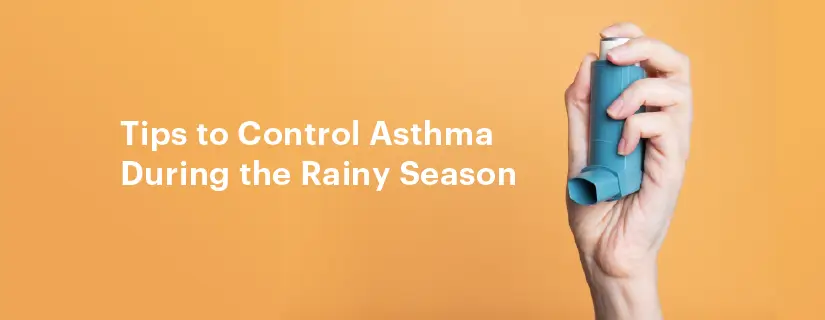
Tips to Control Asthma During the Rainy Season
The rainy season brings relief from the heat, but for asthma sufferers, it can also trigger increased symptoms due to heightened humidity, mold growth, and dust mites. Managing asthma effectively during this season requires extra caution and preventive measures to reduce the risk of flare-ups. Here are some essential tips to control asthma during the rainy season:
1. Avoid Humidity
- Humidity levels rise significantly during the rainy season, which can irritate the airways and trigger asthma attacks. Using a dehumidifier indoors helps to keep moisture levels under control.
- Keep windows closed on particularly humid days to prevent dampness from accumulating inside your home.
2. Keep Your Home Clean
- The rainy season encourages the growth of mold, dust mites, and fungi, which are common asthma triggers.
- Regularly clean damp areas such as bathrooms, kitchens, and basements. Use mold-killing solutions to keep mold from forming.
- Vacuum carpets and furniture to remove dust mites, and wash bedding in hot water frequently.
3. Monitor Indoor Air Quality
- Good ventilation is crucial for controlling asthma. Ensure proper airflow in your living spaces by using exhaust fans and air purifiers.
- Consider investing in a HEPA air purifier to filter out allergens like dust, mold spores, and pollen, which can worsen during rainy weather.
4. Avoid Exposure to Pollen and Outdoor Allergens
- Rain can stir up pollen and outdoor mold spores, increasing the risk of asthma symptoms. If you are allergic to pollen, minimize time outdoors after rain, as the wet environment can trigger allergies.
- Wear a mask when going out to reduce exposure to airborne allergens.
5. Stay Dry and Warm
- Sudden changes in temperature can trigger asthma symptoms. Avoid getting soaked in the rain as this can lead to cold symptoms, which may worsen asthma.
- Dress appropriately for the season with warm, waterproof clothing, and avoid going out in heavy rains when possible.
6. Use Your Inhaler as Prescribed
- Ensure that your rescue inhaler is always with you, especially during the rainy season, as sudden triggers may cause unexpected attacks.
- Follow your doctor’s instructions for using preventive inhalers or other asthma medications to keep symptoms under control.
7. Identify and Avoid Mold Triggers
- Mold thrives in damp environments, and rain can increase the presence of mold spores both indoors and outdoors. Regularly check for signs of mold growth in your home, especially in areas prone to moisture, like bathrooms, basements, and window sills.
- If mold is present, clean the area with mold-killing products and keep the space well-ventilated.
8. Maintain a Healthy Diet and Hydration
- A healthy diet rich in fruits, vegetables, and antioxidants can help boost the immune system and reduce inflammation in the lungs.
- Staying hydrated helps thin mucus, making it easier to breathe and clear the airways.
9. Minimize Contact with Pets
- During the rainy season, pets tend to shed more, and their fur can become damp, contributing to dander and other allergens.
- Bathe and groom pets regularly, and keep them off furniture and bedding to minimize allergen exposure.
10. Regularly Check Weather and Air Quality Reports
- Monitoring weather forecasts and air quality can help you plan activities to avoid high pollen or humidity levels.
- On days when air quality is poor or humidity is high, consider staying indoors to reduce your risk of asthma attacks.
11. Practice Breathing Exercises
- Strengthening your lungs through breathing exercises can help improve overall respiratory health and reduce asthma symptoms.
- Techniques like pursed-lip breathing or diaphragmatic breathing can help you manage shortness of breath during an asthma attack.
12. Take Asthma Medications Regularly
- Don’t miss your prescribed medication doses, even if your symptoms seem under control. Preventive medications help keep inflammation in check and reduce the risk of attacks, especially during weather changes.
- If you notice your symptoms worsening during the rainy season, consult your doctor to adjust your treatment plan accordingly.
13. Limit Physical Activity Outdoors
- Outdoor activities during or immediately after rain can expose you to pollen and mold spores. If you enjoy physical activities like jogging or walking, try to schedule them during periods of low humidity or do them indoors.
14. Consult Your Doctor Regularly
- Keep in touch with your healthcare provider, especially if your asthma worsens during the rainy season. Regular check-ups ensure your treatment plan is effective and can be adjusted if necessary.
15. Use a Nebulizer When Necessary
- If your asthma symptoms become severe or frequent, using a nebulizer to deliver medication directly into your lungs can provide faster relief.
Conclusion
The rainy season presents specific challenges for asthma management, but with proper precautions, you can reduce the risk of flare-ups. By controlling indoor humidity, staying dry, avoiding allergens, and sticking to your medication plan, you can enjoy the rainy season while keeping your asthma under control. Always be mindful of changes in your symptoms and consult your doctor if adjustments to your treatment plan are needed.